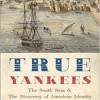Today, I’m happy to introduce the Coastal History Blog’s second guest post, by Katy Roscoe. (The first guest post was by Julia Leikin.) Island studies have featured before in this blog, in “Are Islands Insular?” but also in “Offshore and Offshoring”. In today’s post, Roscoe explains how her work as part of the Carceral Archipelago […]





